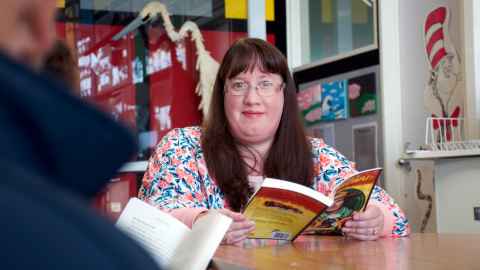Danielle Wilson - MEd (Practice)
After studying a BA joint Honours Degree in History and English and a Postgraduate Certificate of Education in the UK, Danielle Wilson decided to pursue further postgraduate study at the University of Auckland to increase her specialist knowledge for professional growth and gain relevant and practical skills for her career development.

“My experience with the Master of Education (Practice) has been positive. I’ve really enjoyed delving into research and literature in the areas of education I am particularly interested in, such as inclusive practices.”
Luckily for Danielle, the University of Auckland offers Inclusive Education as a specialist subject. Designed to be undertaken part-time while in full-time employment, it’s ideal for teachers and professionals working in learning support roles (such as Special Education Needs Coordinators) as well as allied professionals working in increasingly diverse education settings.
Inclusive Education as a study subject helps teachers develop their knowledge and understanding of how they can deliver the curriculum innovatively and creatively so that all students thrive and have access to learning opportunities - for example, being culturally responsive and using Universal Design for Learning to deliver teaching instruction and various learning opportunities.
“It was important for me to include this in my programme of study because it is key to my role as Learning Support Coordinator (LSC). Part of my role as LSC is to support teachers and teacher aides to create inclusive classroom environments where all students feel valued as members of their classroom and the whole school community.”
One course Danielle found particularly beneficial was EDUC 759: Practice for Neurodiversity, which explores, among other things, the true definition of the term ‘neurodiversity’ and allows students to develop knowledge and understanding of different types of neurodiversity.
“We learnt about various strategies and resources that would best support our neurodivergent tamariki and their whānau to experience success and to feel like valued members of a school community in our schools across Aotearoa. We deepened our understanding of language and how certain words have negative connotations attached to them. Finally, and most importantly, we learnt that neurodiversity is positive and should not be seen through a deficit lens. Individuality and uniqueness are valuable!”
Danielle believes that Inclusive Education is an important study area for those in the field of education to explore as every child has the right to learn and be part of their local school community.
“It helps teachers develop their awareness of how to create inclusive classroom environments that support our neurodivergent learners to make progress and thrive academically and socially.
“I would advise anyone looking to study Inclusive Education at the University of Auckland to go into it with an open mind and a willingness to change their classroom practice. Be sure to use the professional readings the lecturers recommend, as they also give you a good insight into the research and first-hand experiences. Although it seems time-consuming, it is valuable to contribute and share your ideas on the canvas discussion boards as you learn heaps from your peers.”